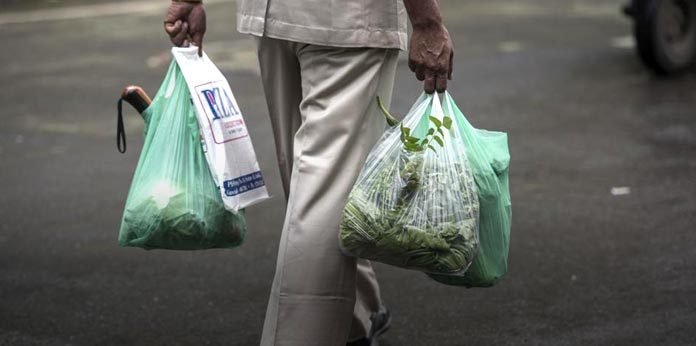
As per the Central Pollution Control Board, at least 25 Indian states have some form of plastic ban, but the implementation is often very lax.
Close on the heels of plastic ban in Maharashtra, Uttar Pradesh government on Friday also issued an order to impose a blanket ban on the use of plastic across the state from July 15. This is the third time since January 2016 that the Uttar Pradesh government has reiterated the ban with no sign of its implementation.
“We have decided to ban plastic in the entire state from July 15, I appeal that after July 15 plastic cups, glasses and polythene should not be used at all. This will need the participation of everyone,” the message in Hindi, was released on CM’s Twitter account.
State officials said the modalities of the ban were being worked out and the department concerned has been asked to submit a blueprint as soon as possible, after which a meeting will be held with the chief minister. Details were being worked out to ensure that the ban can be enforced effectively, officials were quoted as saying by PTI.
Earlier in December 2015, the Akhilesh Yadav-led state cabinet had banned distribution, manufacture and sale of plastic and polythene bags with a thickness of more than 40 microns but the ban could not be implemented seriously.
As per the Central Pollution Control Board, at least 25 Indian states have some form of plastic ban, but the implementation is often very lax. In India, plastic bans can be categorised into complete, partial and not banned.
Indian states where plastic bag is banned
Banned: Jammu and Kashmir, Himachal Pradesh, Uttarakhand, Punjab, Haryana, Rajasthan, Madhya Pradesh, Uttar Pradesh, Maharashtra, Karnataka, Chattisgarh, Sikkim, Arunachal, Tripura, and Nagaland.
Partial ban: Gujarat, Goa, Kerala, Odisha and West Bengal
Not banned: Bihar, Jharkhand, Telangana, Andhra Pradesh, Tamil Nadu, Assam, Manipur and Meghalaya
What all plastic products are covered under the ban in Maharashtra?
As per the notification, products manufactured from plastic and thermocol have been covered under the ban. As a result usage of plastic bags with a handle and without handle, disposable cups, and plates, spoons, forks, glasses, and containers is prohibited in the state. Plastic packaging used to wrap and store the product is also included in the ban.
Apart from this plastic straw, non-woven polypropene bags, pouches and any other plastic used to store, package and transfer food items will no longer be permitted in the state. Besides, it has banned the use of plastic and thermocol for decoration purposes.
Items excluded from the ban in Maharashtra
– Plastic used for packaging medicines and drugs
– Food grade virgin plastic used for packaging milk
– Compostable packaging bags used for horticulture and agriculture purposes
– Plastic bags used for exporting goods
– Plastic used at the manufacturing stage
– Plastic used for handling of solid waste
Fine imposed by authorities in Maharashtra
– Rs 5,000 for first-time offenders
– Rs 10,000 for second-time offenders
– Third-time offenders face a fine of Rs 25,000, along with a three-month imprisonment.
What all plastic products are covered under the ban in Uttar Pradesh?
– Plastic cups, glasses, and polythene bags.
The Uttar Pradesh government is expected to come out with a list of banned plastic items soon.
What are the different types of plastic available?
1. Polyethylene Terephthalate (PET): The most widely produced plastic in the world, used mainly for bottling or packaging. Used to manufacture food jars, beverage bottles, carpet fiber, clothing and some mouthwash and shampoo bottles. It’s highly recyclable.
2. High-Density Polyethylene (HDPE): Stiff plastic fiber used to package items like laundry detergent containers, garden furniture, trash bins, snack boxes, milk jugs, crates and toys. Easily recycled.
3. Polyvinyl Chloride (PVC): It’s well known for its usage in property construction purposes as well as for credit cards, doorframes, spray bottles, pipes and fittings, wire and cable sheathing, etc. the problem with this plastic is that a softer version of PVC can leach toxic phthalates. Very difficult to recycle.
4. Low-Density Polyethylene (LDPE): Used for plastic bags in shopping bags, grocery stores, packaging film, flexible bottles, bubble wrap etc. It is difficult to recycle.
5. Polypropylene (PP): Used in packaging of plastic parts for the automotive industry, consumer products such as drinking straws, fabric and carpet fiber, lunch boxes, tarps, and diapers. Can be recycled.
6. Polystyrene (PS): Widely known as ‘styrofoam’, PS is mainly used in takeout food containers, foam drinking cups, some plastic cutlery, yogurt containers, toys etc. It can leach styrene, which is a neurotoxin.
7. Others: These plastics include baby bottles, compact disks, nylon fabrics, medical storage containers, watercooler bottles etc. This is the most difficult to recycle.
Courtesy: By the Indian Express, Source link



















